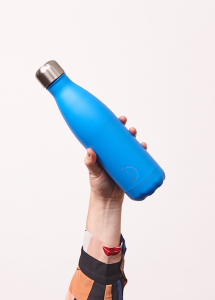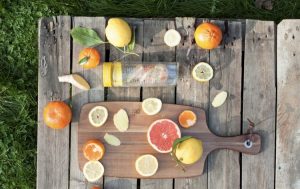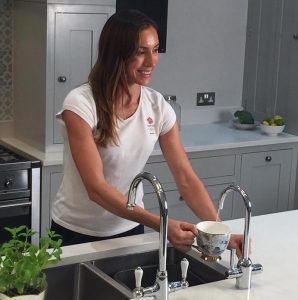Top tips for staying hydrated during the summer heat
Water. It’s one of the most important elements for all living things. Up to 60 percent of the human adult body is made of water. It’s essential for biochemical reactions, supplying nutrients throughout the body and removing waste, and maintaining blood circulation and body temperature. It aids in digestion, prevents constipation, cushions joints, stabilizes the heartbeat, and protects vital organs and tissues.
Without it enough of it, we can become dehydrated. Dehydration might show itself in the form of muscle cramps, fatigue, thirst, and other unpleasant symptoms. Our thinking and concentration can suffer and we can lose appetite, experience mild constipation and be lightheaded.
Getting enough water every day is important to keeping your body functioning correctly. Your body needs more water when its warmer, physically active, running a temperature, and have sickness and diarrhea. It’s easy to go about your day without thinking about how much water you’ve had to drink or forget to take those sips until you start to feel bad. But, especially in the summer heat, water is vital to helping your body stay healthy and hydrated.
How Much Water Do You Need?
According to doctors, there’s no one-size-fits-all formula for daily water intake. The amount of water you should drink daily depends on your body, your health conditions, your medications, and other factors.
There is no exact standard for how much plain water adults and children should drink daily, though there are general recommendations for both women and men. In hot weather one rule of thumb is that women should drink approximately 2.7 litres of water while men should average 3.7 litres of total water. Drinking water should be a part of our daily routine, not something you have to go out of your way to do.
How to Stay Hydrated
The key to staying safe and healthy this summer is staying hydrated. Just follow our top tips:
1. Drink water—and plenty of it!
Start by drinking a glass of water each morning when you wake up or before bed. Have another glass with every meal. Drink one or two cups after working out. To ward off dehydration, drink fluids gradually throughout the day. Refill a reusable bottle to keep with you on the go or at work. There are handy apps for your phone to keep track or ask Alexa to remind you every hour and a half to refill!

2. Know the signs of dehydration.
Does your skin feel dry, irritated, inflamed, itchy, or sensitive? That’s a sign of dehydration. Experiencing a headache or feeling dizzy or fatigued? These are signs, too. Muscle cramps, rapid breathing, fainting, and not urinating (or having very dark yellow urine) are others. If you’re experiencing any of these symptoms, the simple solution is to get out of the heat and drink plenty of liquids. If symptoms worsen call your healthcare specialist.
3. Check your wee.
A good measurement of hydration is the colour of your urine. Pale urine, similar to the colour of straw, indicates proper hydration while darker urine is a sign that you need more water. A dark yellow or amber colour means you may have mild to severe dehydration.
4. Avoid alcohol and sugary drinks.
Some liquids work against hydration! Drinks such as sugary fizzy, beer, wine, lemonade, sweet tea, energy drinks, smoothies, and flavoured milk are all culprits. They are loaded with sugar, sodium, and other ingredients that remove water from your tissues. Consider swapping some of these out daily or rehydrating with more water for each dehydrating drink you consume.
5. Cool down.
Proper hydration isn’t just about drinking water—it’s about regulating your body temperature, too. During summer, when the risk for heat stroke is at its highest, wear light, loose-fitting clothing in light shades; schedule strenuous sports and physical activities during cooler times of the day; protect yourself from the sun with hats and other shade accessories; take drink breaks often; and mist yourself with a spray bottle if you become overheated.
6. Eat foods with high water content.
Did you know that approximately 80 percent of our water intake comes from drinking water? The other 20 percent comes from food. All whole fruits and vegetables contain some water, but snack on these for maximum benefit: cucumbers, celery, tomatoes, radishes, peppers, cauliflower, watermelon, spinach, strawberries, broccoli, and grapefruit. They all contain 90 percent water or higher.
7. Replenish when you sweat.
It’s essential to drink water throughout physical activity whether walking, cycling or in the gym based on your sweat rate and the humidity. Proper hydration means getting enough water before, during, and after exercise. Drink two to three hours before you exercise; take a glass 20-30 minutes before you exercise and a glass every 10-20 minutes during exercise. Drink no more than a glass 30 minutes after exercise.
8. Wearing a mask.
We are all find mask wearing a hot experience. Make sure you keep a reusable bottle with you to keep on top of overheating when wearing your mask for shopping, travel, going to the gym or on business.

9. Infuse your water.
Try jazzing up your water by adding a few fresh ingredients. Limes, lemons, mint, oranges, berries, cucumbers, and other fruits improve the taste without artificial sweeteners or preservatives. This can help you drink more water than you usually do, too. You can also give coconut water a try. This mineral-rich liquid is packed with potassium, magnesium, sodium, and calcium, so it replenishes lost fluids and electrolytes from exercise and hot climates quickly.
Refill a reusable.
By keeping your glass or water bottle topped up with frequent visits to the plumbed-in office water cooler, it makes hydration that much easier. Keep it within arm’s reach and take frequent sips as opposed to large gulps every now and again.
With many offices re-opening and re-configuring their work spaces to be safe and avoid gatherings, your firm may consider adding more hydration points in the building to avoid queues. We have some great back to work offers.Refill stations also help reduce singles plastic bottle pollution ending up in landfill so a choose to reuse and recycle.
The refill.org scheme around the UK shows handy places where you can refill for free on the go on a street near you; just sign up to the app.

Herbal tea is another great way to get water into your system – and a KettleTap makes fast work of this. Evening time is probably the best part of the day to follow this healthy routine. By developing this new habit, you will start to relax a little more whilst ensuring that dehydration is kept at a distance.
Enjoy the summer and stay alert and safe according to government guidelines with social distancing, regular handwashing and wearing face coverings. If you follow these simple tips, we can guarantee that you will feel alert and healthy through this heatwave.




